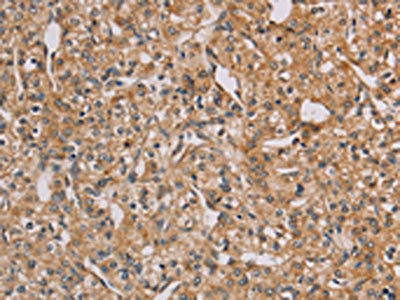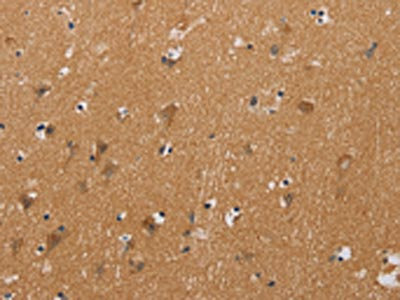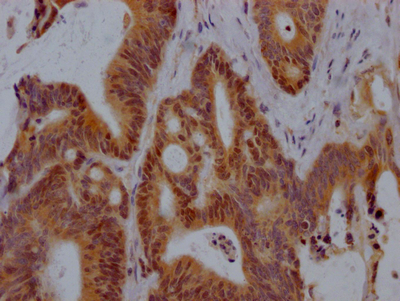CHRNA4 Antibody
-
货号:CSB-PA215866
-
规格:¥1100
-
图片:
-
The image on the left is immunohistochemistry of paraffin-embedded Human prostate cancer tissue using CSB-PA215866(CHRNA4 Antibody) at dilution 1/20, on the right is treated with fusion protein. (Original magnification: ×200)
-
The image on the left is immunohistochemistry of paraffin-embedded Human brain tissue using CSB-PA215866(CHRNA4 Antibody) at dilution 1/20, on the right is treated with fusion protein. (Original magnification: ×200)
-
Gel: 8%SDS-PAGE, Lysate: 40 μg, Lane 1-2: Lovo cells, 293T cells, Primary antibody: CSB-PA215866(CHRNA4 Antibody) at dilution 1/200, Secondary antibody: Goat anti rabbit IgG at 1/8000 dilution, Exposure time: 5 seconds
-
-
其他:
产品详情
-
Uniprot No.:P43681
-
基因名:CHRNA4
-
别名:A4 nicotinic receptor antibody; Acetylcholine receptor alpha 4 neural antibody; Acetylcholine receptor neuronal nicotinic alpha 4 subunit antibody; ACH 4 antibody; ACH4 antibody; ACHA4_HUMAN antibody; AChR antibody; Acra 4 antibody; Acra4 antibody; Alpha4 nAChR antibody; BFNC antibody; Cholinergic receptor nicotinic alpha 4 antibody; Cholinergic receptor nicotinic alpha polypeptide 4 antibody; CHRNA 4 antibody; CHRNA4 antibody; EBN 1 antibody; EBN antibody; EBN1 antibody; NACHR antibody; NACRA 4 antibody; NACRA4 antibody; Neuronal acetylcholine receptor subunit alpha-4 antibody; Neuronal nicotinic acetylcholine receptor alpha 4 subunit antibody
-
宿主:Rabbit
-
反应种属:Human
-
免疫原:Fusion protein of Human CHRNA4
-
免疫原种属:Homo sapiens (Human)
-
标记方式:Non-conjugated
-
抗体亚型:IgG
-
纯化方式:Antigen affinity purification
-
浓度:It differs from different batches. Please contact us to confirm it.
-
保存缓冲液:-20°C, pH7.4 PBS, 0.05% NaN3, 40% Glycerol
-
产品提供形式:Liquid
-
应用范围:ELISA,WB,IHC
-
推荐稀释比:
Application Recommended Dilution ELISA 1:1000-1:2000 WB 1:200-1:1000 IHC 1:25-1:100 -
Protocols:
-
储存条件:Upon receipt, store at -20°C or -80°C. Avoid repeated freeze.
-
货期:Basically, we can dispatch the products out in 1-3 working days after receiving your orders. Delivery time maybe differs from different purchasing way or location, please kindly consult your local distributors for specific delivery time.
相关产品
靶点详情
-
功能:After binding acetylcholine, the AChR responds by an extensive change in conformation that affects all subunits and leads to opening of an ion-conducting channel across the plasma membrane permeable to sodium ions.
-
基因功能参考文献:
- cryoelectron microscopy and the structural principles of distinct assemblies of the human alpha4beta2 nicotinic receptor PMID: 29720657
- Results are comparable to the impact of nicotine on withdrawal-related impaired plasticity in smokers and suggest that alpha4beta2 nicotinic receptors are relevantly involved in plasticity deficits and restitution in smokers. PMID: 28469204
- Orienting attention predicted by CHRNA4 and maternal sensitivity interaction in 6-month-old infants. PMID: 28582665
- This study demonstrated that rs1044396 of CHRNA4 was significantly associated with Internet gaming disorder PMID: 29240768
- the mechanism of interaction between [Upsilon4E]GID and the agonist binding pockets of the alpha4beta2 and the halpha7 receptors, and to estimate their relative binding affinities, was investigated. PMID: 27721068
- Reactive oxygen species, generated by 6-hydroxydopamine (6-OHDA), could cause the current rundown in alpha4beta2 nAChRs, which may play a role in Parkinson disease. PMID: 27445102
- As well as basal forebrain and brainstem cholinergic system dysfunction, cholinergic deficits mediated through nicotinic acetylcholine receptors could be evident within key networks in AD. PMID: 27565302
- A polymorphism in CHRNA4 leads to an overdominant effect at this locus, with higher activity in the cingulo-opercular network underlying alertness. PMID: 28877969
- Ability to navigate in the wilderness benefits from heightened ability to focus attention (CHRNA4). PMID: 27123786
- Data suggest that amino acid residues alpha4Gly-41, alpha4Lys-64, and alpha4Thr-66 are critical for (alpha4)3(beta2)2 neuronal AChR potentiation by positive allosteric modulator (PAM) CMPI, but not by PAM NS9283; amino acid substitution at alpha4His-116, a known determinant of NS9283 binding and of agonist binding at alpha4:alpha4 subunit interface, did not reduce CMPI potentiation. PMID: 28446611
- This study shows that unorthodox acetylcholine binding sites can form at the alpha5/alpha4 and beta3/alpha4 interfaces in (alpha4beta2)2alpha5 and (alpha4beta2)2beta3 nicotinic acetylcholine receptors (nAChRs) and at the alpha4/alpha5 in (beta2alpha4)2alpha5 nAChRs. PMID: 27645992
- the role of CHRNA4 and CHRNA7 genetic polymorphisms in moderating auditory target and novelty attentional processing in healthy subjects exposed to the auditory "oddball" P300 paradigm. PMID: 27109789
- The form containing three copies of alpha4 and two of beta2 was potentiated at low concentrations of acetylcholine chloride (ACh) and physostigmine, whereas the form containing two copies of alpha4 and three of beta2 was inhibited. PMID: 27895161
- X-ray crystallographic structure of the human alpha4beta2 nicotinic receptor, the most abundant nicotinic subtype in the brain; structure provides insights into the architectural principles governing ligand recognition, heteromer assembly, ion permeation and desensitization in this prototypical receptor class PMID: 27698419
- findings indicate that alterations in expression of the alpha4beta2 subtype of nAChR may be involved in the molecular mechanism(s) underlying the cognitive deficit associated with vascular dementia PMID: 26858154
- Study presented several lines of evidence for the role of a variant encoding CHRNA4 R336C in smoking behavior and risk of smoking-related diseases PMID: 26952864
- Prepulse inhibition may be influenced by the polymorphisms of the CHRNA4 in schizophrenia and it may be a potential endophenotype of schizophrenia. PMID: 26982087
- Study observed a significant association between the rs1044396 SNP in the CHRNA4 gene and the personality trait harm avoidance PMID: 26612384
- Results provide further evidence that common synonymous CHRNA4 exon 5 SNPs affect cognitive processes and suggest that they also play a role in the auditory system. PMID: 27054571
- Common CHRNA4 variant with important regulatory properties that contributes to nicotine dependence and smoking-related consequences was identified. PMID: 26440539
- Data show alpha4 subunit role in conferring potentiation by 17beta-estradiol (BEST) and indicate that the C-terminal region is involved in both binding of betaEST and potentiation, while the N-terminal domain seems involved in enhancing its efficacy. PMID: 26684647
- the identity of subunits neighboring the otherwise equivalent alpha4(+)/(-)beta2 agonist sites modifies their contributions to nAChR activation and E-loop residues are an important contributor to this neighbor effect PMID: 26644472
- findings demonstrate that the complementary alleles of the CHRNA4 exon 5 haplotype differ with respect to mRNA stability, codon usage and agonist sensitivity PMID: 25934188
- CHRNA4 rs1044396 CT/TT genotype is related to cigarette smoking in Parkinson's disease patients. PMID: 26125703
- study demonstrated that genetic variation of CHRNA4 (rs1044396) increased blink rate while watching a video; suggests that differences in sensitivity to acetylcholine because of the genetic variation are associated with individual differences in spontaneous eye blink rate PMID: 25729002
- Study investigated whether the rs1044396 polymorphism of the CHRNA4 gene modulates response speed and selective visual attention in the Stroop task, Negative priming task, and Posner-Cuing task in n = 157 healthy participants PMID: 25639542
- analysis of how an agonist to the binding site promotes activation of alpha4beta2* nicotinic acetylcholine receptors PMID: 25869137
- Description of a de novo missense mutation in the transmembrane domain M2 segment of CHRNA$, c.823A>T, which decreased the surrounding hydrophobicity and slightly altered secondary structure of the protein PMID: 25282705
- Data indicate the binding mode and modulatory mechanism of NS9283 at alpha4beta2 nicotinic acetylcholine receptors. PMID: 24982426
- Variants in CHRNA4 may contribute to risk of binge drinking in young adults. PMID: 24428733
- There were no effects of CHRNA4 or DAT1 on either facilitation or inhibition of return. PMID: 23731290
- A significant association between CHRNA4 variants and a subgroup of smokers. PMID: 24498031
- Smokers with less upregulation of available alpha4beta2* nAChRs have a greater likelihood of quitting with treatment than smokers with more upregulation. PMID: 24850280
- Our findings demonstrate, for the first time, that genetic variations in CHRNA4 can moderately contribute to individual differences in natural-scene categorization performance. PMID: 23720086
- findings suggest that CHRNB2 rs4845652 T-allele carriers may be associated with lower levels of nicotine dependence (ND), and that certain allelic combinations of CHRNA4 and CHRNB2 might be correlated with higher ND levels. PMID: 23037950
- significant effects of the alpha4 variants on nAChR expression, subcellular distribution, and sensitivity to nicotine-induced receptor upregulation. PMID: 24385388
- The results have excluded the involvement of any known mutations of the CHRNA4 gene. PMID: 24327142
- Data indicate that compounds showed favorable subtype selectivity for beta2*-nAChRs over beta4*-nAChRs. PMID: 23734673
- Smoking reduction and cessation lead to decreased alpha4beta2* nAChR densities across brain regions. PMID: 23429692
- Variation in CHRNA4 appears to contribute to child personality by affecting degree of developmental sensitivity to both normal and adverse environments. PMID: 23240931
- Nicotinic acetylcholine receptor subunits alpha4 and alpha5 associated with smoking behavior and lung cancer are regulated by upstream open reading frames. PMID: 23843950
- rs755203 and rs1044397 in CHRNA4 might play a role in the pathophysiology of nicotine dependence in healthy controls in the Japanese population PMID: 23553665
- SNPs in CHRNA4 associate with DSM -IV nicotine dependence symptom counts in young adults. PMID: 23350800
- alpha4beta2-nAChR is a sensitive target to mediate oligomeric alpha-synuclein-induced modulation of cholinergic signaling. PMID: 23437071
- We found significantly reduced gray matter volume in the right putamen in carriers of the DRD2 C/C and CHRNA4 T/T groups. PMID: 22947540
- Data indicate that both acetylcholine and nicotine showed much attenuated interaction with alpha4beta4 receptor. PMID: 23349463
- NMR resolved multiple anesthetic binding sites in the TM domains of the alpha4beta2 nAChR PMID: 23000369
- The T- variant (CC genotype) of the rs1044396 polymorphism on the CHRNA4 gene exerts pleiotropic effects on a vast range of behaviors, including cognition, emotion, and addiction PMID: 22722381
- the present data confirm that CHRNA4 variants are overrepresented in SALS strengthening the hypothesis can they act as predisposing genetic factors for ALS. PMID: 22873564
- Data indicate that cytisine, varenicline, and nicotine are all high affinity binders for the alpha4beta2 nAChRs, but all display lower affinity for the alpha7 subtype receptor. PMID: 22553201
显示更多
收起更多
-
相关疾病:Epilepsy, nocturnal frontal lobe, 1 (ENFL1)
-
亚细胞定位:Cell junction, synapse, postsynaptic cell membrane; Multi-pass membrane protein. Cell membrane; Multi-pass membrane protein. Cell membrane; Lipid-anchor.
-
蛋白家族:Ligand-gated ion channel (TC 1.A.9) family, Acetylcholine receptor (TC 1.A.9.1) subfamily, Alpha-4/CHRNA4 sub-subfamily
-
数据库链接:
HGNC: 1958
OMIM: 118504
KEGG: hsa:1137
STRING: 9606.ENSP00000359285
UniGene: Hs.10734























